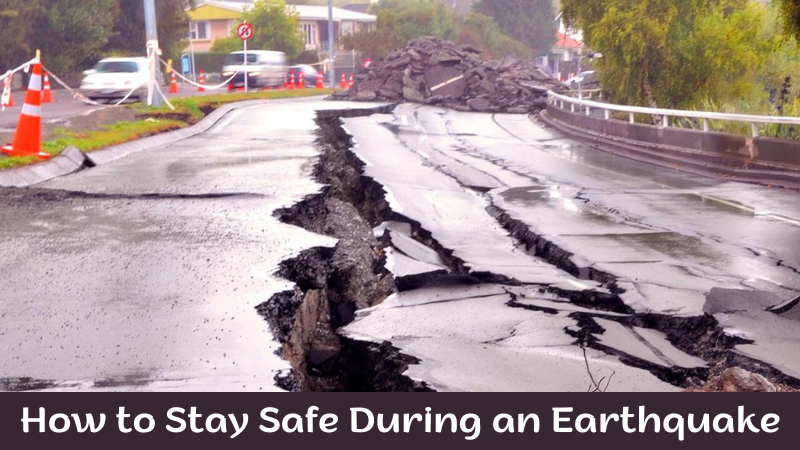How to Stay Safe During an Earthquake: Tips, Preparation, and Readiness

An earthquake is the only natural element that cannot be predicted.
Signs of earthquakes almost always appear suddenly – tremors are felt, chandeliers begin to sway, dishes in cupboards ring, walls and furniture crackle.
During an earthquake, the first shocks are the strongest, the strength of all subsequent vibrations is noticeably weaker.
The main rule during an earthquake is to leave the upper floors of buildings as soon as possible (if possible, turn off gas, water and electricity).
If there is no way to leave the building quickly, you need to take places in the openings of the supporting structures of the room (door and interior openings).
After the tremors stop, immediately leave the building, using only flights of stairs – the elevator shaft can be deformed, and the elevator can jam. On the street, you need to take a place in an open area, away from high-rise buildings and structures, power line supports that can collapse.
When driving, you must stop in a safe place. Stopping on bridges and viaducts is not allowed.
Under no circumstances should you give in to panic, lose self-control. You need to remain calm and call for calm others.
Below are the rules and procedures to follow in case of an earthquake that everyone should know.
How to prepare for an earthquake?
What to do if an earthquake happens while at home?
- Have a detailed discussion with your family about the possibility of an earthquake, make and ask the family to remember well the plan for gathering the whole family after an earthquake. Mark the collection point in an open area near the house.
- Plan in advance the most economical and safe way out of the premises in case of an earthquake. Remember that it can happen at night when the lights are off, stairwells, corridors, doors will be clogged with people.
- Determine the safest places in the apartment (house) in advance: internal corners of the main walls and openings of entrance doors, places under the beams of the building frame (seismic belt), tables, beds.
- Teach children how to act during an earthquake, teach them to take a safe place.
- Check the condition of your home – ceilings, roofing, chimney, electrical wiring and gas pipes. Determine what measures are required to strengthen it.
- Provide in the apartment (house) the possibility of a quick exit, remove unnecessary, interfering things from the corridors and aisles.
- Sleeping places should be located away from large windows, glass partitions, mirrors that can fall. Do not keep shelves above beds and sofas.
- Do not store flammable or poisonous liquids in the apartment, or store them in a safe place where they cannot spill.
- Have a first aid kit ready and know how to provide it. If you are constantly taking any medications, keep a supply of them.
- Always have a battery-powered radio, a flashlight and a supply of batteries for them, and matches at the ready.
- Find out how gas, electricity and water are turned off in your apartment (house). If a wrench is needed to shut off the line, place or tie it close to the valve to be closed.
- It is advisable to keep documents in a bag so that you can quickly take them with you, if necessary.
- When stocking up on canned foods and drinks, plan for the first 3 to 5 days. All this can be put in a backpack or bag and stored in a conspicuous place.
What are the first steps to take in the event of an earthquake?
When receiving an alarm, consider the following tips and tricks for surviving an earthquake (depending on the specific situation and development of events):
- Turn on the radio, TV, any source of live broadcasting, in order to finally make sure that there is a serious threat of an earthquake, as well as receive recommendations for action and the latest information on the current situation;
- Inform relatives, neighbors, people within reach about the threat, while limiting yourself to short phrases without unnecessary emotions, saving time and not panicking others. It is best to limit yourself to advice to turn on the radio, TV for more complete information;
- Gather all members of your family in order to distribute the responsibilities for the collection and preparation for a possible evacuation;
What to do if evacuation is necessary?
- Pack essential items, passports, other important documents, money, valuables in a backpack or any container convenient for you.
- Fill a container with water, prepare a small amount of canned food;
- Prepare the apartment for conservation (lock all windows, balconies with locks, latch, turn off gas, water, turn off electrical appliances from the mains), lock the entrance doors;
- Take personal protective equipment (respirators, gas masks, gauze bandages, etc.), if available;
- Take clothes (necessarily a warm set);
- At the first shocks, try to leave the building as soon as possible. Every second counts in this situation. It is strongly not recommended to use the elevator – only the stairs!
- Run out of the house quickly but carefully. Beware of debris, electrical wires and other sources of danger.
- Move away from buildings and power lines, open space with clear skies – 90 percent life saved in case of an earthquake. Listen to the information on the receiver about the development of the situation.
- Help the handicapped in the neighborhood, the elderly and the sick, help other people who need help.
If you did not have time to evacuate from the apartment, what should you do to save your and your family’s lives?
- If you were unable to leave the apartment, stand in the doorway or in the corner of the room (near the load-bearing wall), as far as possible from windows, chandeliers, hanging shelves, mirrors, cabinets. If you don’t know what a load-bearing wall is or it’s much easier for you to lie down, then settle under a table, a bed, while you warn yourself against falling pieces of plaster, bricks, broken glass and other troubles, turn away from the window, cover your head with your hands. Leave the corner rooms immediately if you are above the second floor.
- After the main impact of the earthquake, if you and those who were nearby were bypassed by the trouble and you can move around, try to leave the building as soon as possible, pressing your back against the wall, if they are still in place. Along the way, someone may need help, depending on your physical condition, provide all possible first aid to the injured, help with the evacuation of other people, if it is in your power.
- Be careful when seeking and giving help. There may be repeated earthquakes, so assess the situation soberly, without succumbing to panic, make a decision – go to the rescue or stay on the street.
- If an earthquake caught you driving, stop, leave the car, motorcycle until the end of the tremors. If you find yourself on public transport, do not panic, ask the driver to stop and open the doors if he did not do it himself. It is advisable to leave the salon after jolts.
- If an earthquake overtook you on the railway, do not panic, in this case everything depends to a greater extent on the drivers and the work to prevent accidents of people specially trained in this. Grab the handrails, wait for notifications from the driver, in case of an emergency evacuation, follow everyone, avoiding panic and crush.
- Remain calm in any of these situations – to the extent possible. Panic during an earthquake only hurts, as deplorable experience shows.
These basic earthquake safety tips will help you survive. Be prepared to take decisive action in the event of an earthquake.
